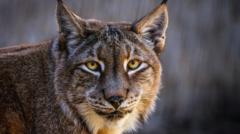Should Unwanted Pets Become Dinner for Zoo Predators?

Understanding Aalborg Zoo's Unique Approach to Animal Care and Diet
Aalborg Zoo in Denmark has initiated a unique effort that not only addresses the dietary needs of its carnivorous residents but also appeals to the community for support. By inviting the public to donate healthy unwanted pets, such as chickens, rabbits, and guinea pigs, the zoo aims to create an environment that closely mimics the natural food chain of these predators. This innovative approach not only ensures that the animals are well-fed but also fosters a sense of community involvement in wildlife conservation.
The Importance of a Natural Diet for Carnivorous Animals
Feeding carnivorous animals a diet that closely resembles what they would hunt in the wild is essential for their health and well-being. At Aalborg Zoo, the dietary regimen includes smaller livestock, which plays a crucial role in providing the necessary nutrients for predators such as lions, tigers, and the Eurasian lynx. The zoo's deputy director, Pia Nielsen, emphasized that it is vital to offer these animals meat that comes with fur and bones, as it contributes to a more natural feeding experience.
How Do Donations Work?
The zoo has set clear guidelines for those interested in donating their pets. Donations can be made on weekdays, and donors are asked to limit their contributions to four animals at a time and to do so without an appointment. This structured approach ensures that the zoo can manage the intake of animals efficiently while also maintaining the highest standards of care for both the donors and the animals being received.
Types of Animals Accepted for Donation
Aalborg Zoo accepts a variety of small livestock as donations. The primary animals that the zoo is seeking include:
- Chickens
- Rabbits
- Guinea pigs
- Horses
While the first three categories are primarily used for feeding the carnivores, horses can be donated as well under specific conditions. This unique opportunity allows horse owners to contribute to the zoo while potentially benefiting from a tax deduction.
Eligibility Criteria for Donating Horses
For horse owners considering donating their animals, there are specific eligibility criteria that must be met:
- The horse must have a valid passport.
- The horse should not have received treatment for any illness within the last 30 days.
These requirements ensure that the horses are healthy and can be safely integrated into the zoo’s existing animal care protocols.
The Ethical Considerations of Feeding Practices
The ethical implications of using live animals as food for predators can be a contentious topic. However, Aalborg Zoo's approach is rooted in a philosophy aimed at imitating natural behaviors and dietary needs. By allowing animals that may need to be euthanized for various reasons to serve a purpose, the zoo contributes to a sustainable practice that many in the community support. Pia Nielsen highlighted that this practice is common in Denmark, as it aligns with the values of conservation and animal welfare.
Community Involvement and Education
Engaging the community in this way helps raise awareness about wildlife conservation and the challenges zoos face in providing proper nutrition for their animals. By donating pets, individuals can take an active role in supporting the zoo and its efforts to maintain a natural habitat for its carnivorous animals.
Benefits of Community Involvement
The benefits of community involvement extend beyond just providing food for the animals. Some of the key advantages include:
- Enhancing public awareness about wildlife conservation.
- Encouraging responsible pet ownership.
- Creating a sense of community ownership and pride in local wildlife facilities.
- Offering educational opportunities for families and children about animal care and ecosystems.
Such initiatives can foster a stronger connection between the public and the zoo, making it a focal point for community engagement and education.
Conclusion: A Call for Responsible Pet Ownership
Aalborg Zoo's appeal for donations of small livestock is not just about feeding its predators; it’s a multifaceted approach to animal care, community involvement, and conservation. By inviting the public to participate, the zoo is fostering an environment where responsible pet ownership and ethical considerations play a vital role in wildlife management. This initiative encourages individuals to think critically about their pets' needs and the potential for contributing to a greater cause.
FAQs
What types of animals can I donate to Aalborg Zoo?
Aalborg Zoo accepts live chickens, rabbits, guinea pigs, and horses, following specific eligibility criteria for horse donations.
Are there any restrictions on the number of animals I can donate?
Yes, you can donate a maximum of four animals at a time without making an appointment.
What are the benefits of donating my unwanted pets to the zoo?
Donating pets helps provide a natural diet for the zoo's carnivorous animals and can offer potential tax benefits for horse donors.
How does Aalborg Zoo ensure the health and safety of donated animals?
The zoo has established guidelines and eligibility criteria to ensure that all donated animals are healthy and suitable for their dietary needs.
In light of Aalborg Zoo's innovative approach to animal care, how do you feel about the role of community engagement in wildlife conservation efforts? #WildlifeConservation #AnimalWelfare #CommunityEngagement
```Published: 2025-08-04 19:54:11 | Category: world



